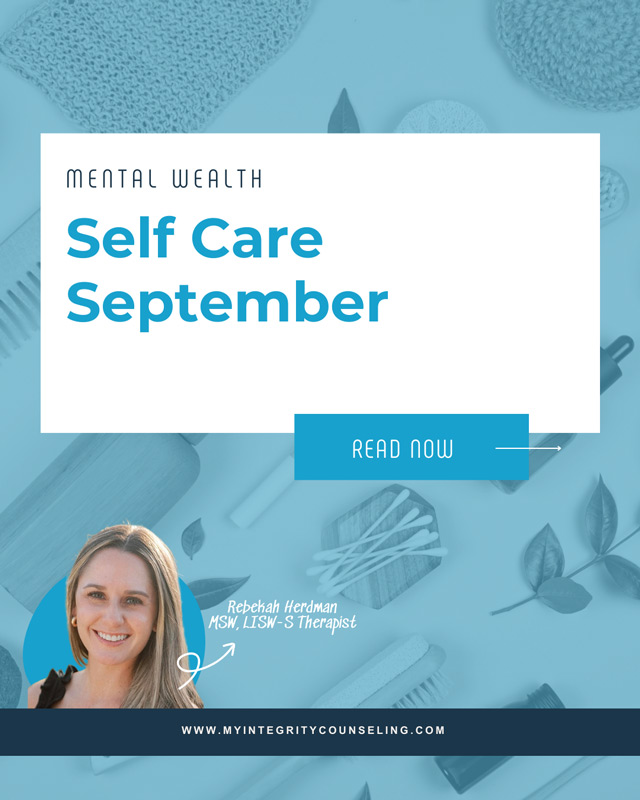Self-Care September by Rebekah Herdman, LISW
In today’s fast-paced world, where responsibilities and stressors seem endless, taking time for self-care is more crucial than ever. Self-care is not just a luxury; it’s a fundamental aspect of maintaining our mental, emotional, and physical well-being. Prioritizing ourselves can lead to a healthier, happier, and more productive life.

What is Self-Care?
Self-care refers to intentional activities and practices that we engage in to nurture our health and well-being. It includes everything from getting enough sleep, eating nutritious foods, and exercising, to practicing mindfulness, setting boundaries, and taking time for hobbies and relaxation.
Why is Self-Care Important?
- Reduces Stress and Anxiety
Regular self-care activities help lower stress levels by providing a break from daily pressures. Whether it’s a quiet walk or meditation, these practices help calm the mind and reduce feelings of anxiety. - Improves Physical Health
Engaging in physical activity, eating well, and getting sufficient rest boost our immune system and energy levels. Proper self-care can prevent illness and promote longevity. - Enhances Emotional Well-Being
Taking time for oneself fosters a positive outlook and resilience. It allows us to process emotions, reflect, and recharge, which improves mood and overall mental health. - Boosts Productivity and Focus
When we prioritize self-care, we’re better equipped to handle responsibilities and make decisions. It enhances concentration, creativity, and productivity in both personal and professional life. - Strengthens Relationships
Self-care helps us establish healthy boundaries and communicate our needs effectively. When we are well-rested and emotionally balanced, our relationships tend to improve.
How to Set Self-Care Goals
Setting clear, achievable self-care goals helps make self-care a consistent part of your routine. Here are some tips:
- Identify Your Needs: Reflect on what areas of your life need more attention—physical, emotional, mental, or social.
- Be Specific: Instead of vague goals like “exercise more,” aim for “walk 30 minutes three times a week.”
- Start Small: Begin with manageable goals to build confidence and consistency.
- Create a Plan: Schedule self-care activities into your calendar just like appointments.
- Track Progress: Keep a journal or use apps to monitor your goals and celebrate milestones.
- Adjust as Needed: Life changes, so revisit and modify your goals to stay motivated.
Examples of Self-Care Goals
Here are some practical examples to inspire your self-care journey:
- Physical: Exercise three times a week, drink eight glasses of water daily, or get 7-8 hours of sleep each night.
- Emotional: Practice journaling every morning, limit social media use, or schedule weekly time to connect with loved ones.
- Mental: Dedicate 10 minutes daily to meditation or mindfulness, read a new book each month, or learn a new skill.
- Social: Plan regular outings with friends, join a club or group, or set boundaries to protect your alone time.
The Importance of Having an Accountability Partner
Having someone to support and encourage you can significantly increase your chances of sticking to your self-care goals. An accountability partner can be a friend, family member, or coach who:
- Provides Encouragement: They motivate you to stay committed to your self-care routines.
- Offers Support: They listen and offer advice when you face challenges.
- Keeps You Honest: They help you stay accountable and remind you of your commitments.
- Creates a Shared Experience: Engaging in self-care activities together can make the process more enjoyable and sustainable.
Remember, sharing your goals with someone trusted creates a sense of responsibility and community, making your self-care journey less lonely and more effective.
Final Thoughts
Self-care is not selfish; it’s an essential part of a balanced and fulfilling life. By dedicating time to nurture ourselves, setting clear goals, and enlisting support from an accountability partner, we create a strong foundation for better mental health, physical vitality, and emotional stability.
As the saying goes, “Taking care of yourself is the most powerful way to begin to take care of others.” Make self-care a priority today—your well-being will thank you!


